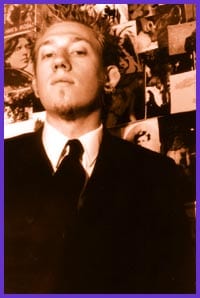A friend recently asked me if someone could be a pagan without them knowing it. I guess you could just as easily ask: can a person be queer without knowing it?
I have always known I was a pagan, and I have always known I was a fag, but what lacks sometimes is the ability to express or share it properly. This is especially difficult if what you seek, and what you are, has traditionally been misunderstood, deemed “evil” or has simply been buried by our culture.
Whether you need a community to help you enhance it, or a history to situate yourself in, gravitating to paganism, the occult or witchcraft stems from this single base drive: to understand and fulfill the desires you’re born with…. Besides, now that Halloween is in the air, it’s a perfect time to once again parade around the local witches for people to gawk at.
“Pagan” was once a simple, flattering Latin term used to dignify someone who had a special connection to the earth: a farmer or land-dweller. It was only in the mouths of Christians that this phrase would eventually become an epithet, kind of like “faggot” and “dyke.”
For pagans then as now, the worship of, and utmost respect for, nature (including humanity’s place in it) is what lies at the core of pagan beliefs. This is where we get our reputation for enjoying both orgiastic sex, and a strong penchant for vegetarianism.
Precise accounts of how and why early pagans performed their rituals are often hard to come by, and it’s usually best to cast a wide and skeptical net if you go looking for information about it. Like queer history, much of the pagan tradition has been eradicated, seeing as we were all burnt together.
As Christianity developed, pagans (which came to mean anyone not Christian) were continually slaughtered, serving to all but annihilate our oral histories. Churches were erected over top of sacred pagan sites. Innumerable artifacts were also destroyed in the interests of erasing the old traditions, many of them containing images of transgendered shamans, faggot adepts and dyke priestesses.
It’s assumed that pagans all fall into one particular category, when really we are far more varied. Just as there are all sorts of queers, there are a few things that all pagans share. But beyond that we are extremely divergent. Many of us don’t even believe in gods or goddesses, instead we interpret them metaphorically.
Actually, the dualistic idea of the God and the Goddess which governs much of paganism might seem problematically straight. But it is generally understood as an expression of elements that reside within everyone: male and female; above and below; darkness and light; the ideal state being a balance of both aspects… which suits queers just fine.
Some of us still wear ceremonial robes, whereas some wear nothing at all. Some belong to covens, others go solo, some of us still cast circles, while some of us have incorporated video images and collage into our rituals. Call them spells if you like, but it is merely another way of being in touch with our environment. As the world changes, so does the way we choose to relate to it.
Personally, I have always had an interest in the occult, even from a very young age. I find that this is a trait common to most pagans, it even emerged in my conversation with Wiccan Priestess (and former Xtra columnist) Lynna Landstreet. She tends a website (www.wildideas.net) dedicated to queers, Wicca and paganism, amongst other things.
While Lynna discovered Wicca and witchcraft, I was lead, instinctively, to Ceremonial Magick, thee Temple Ov Psychic Youth (TOPY), and the works of Aleister Crowley.
In the 1920s, Crowley was not only known for being “the wickedest man in the world,” but he was also an accomplished poet, mountain climber, man of letters, magician and a rampant bisexual.
TOPY’s and Crowley’s interests in making magick widely accessible fueled my own explorations and fostered the seamless integration of my sexuality with my magickal practice. It was on this basis that I was duly inspired to produce nine issues of my zine, the Salivation Army. It wasn’t alone. Two additional QueerPagan zines emerged almost simultaneously with my own, Paul Zevenhuizen’s effulgent Infantile, and Pamela Brown’s Paganda.
The response to the Salivation Army still leaves me a little startled, but it did not develop in a vacuum. On the contrary, paganism, witchcraft and queers have a long and intimate history together that continues to be uncovered.
My own involvement with paganism has taken me into Wiccan circles, Templar orders, spunk-stained TOPY lofts and the pinnacle of decadence, a private Radical Faerie gathering with a guest list of more than 500.
Unlike more dogmatic or ideologically rooted beliefs, being a pagan is not an end in itself. It’s so easy to romanticize it, but really pagans aren’t bound by anything more than the ecstatic drive to continually uncover what has been lost, hidden, or willfully kept out of their grasp.

 Why you can trust Xtra
Why you can trust Xtra


